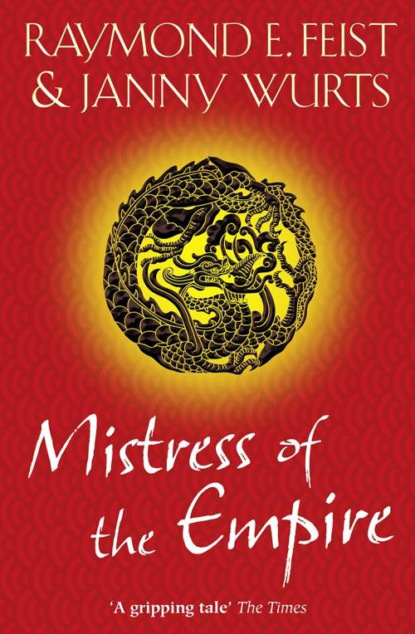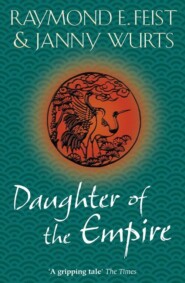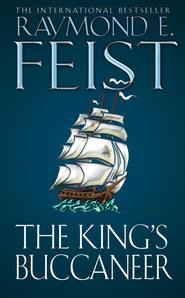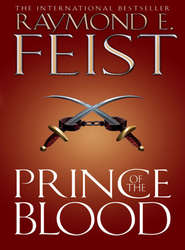По всем вопросам обращайтесь на: info@litportal.ru
(©) 2003-2025.
✖
Mistress of the Empire
Автор
Год написания книги
2018
Настройки чтения
Размер шрифта
Высота строк
Поля
Celebration was called for, certainly, but Hokanu would not cause Mara an instant of unhappy memory by arriving at her side with the smell of spirits on his breath. So he paced, unable to think of any appropriate diversion. He could not help listening avidly, to identify each noise that emerged from behind the closed screens. The rush of hurried steps told him nothing, and he worried, by the quiet, what Mara might be enduring. He cursed to himself and raged inwardly that the mysteries of childbirth held no place for him. Then his lips twitched in a half-smile as he decided that this ugly, twisting frustration of not knowing must be very near what a wife felt when her husband charged off into battle.
In time, his vigil was disrupted as Lujan, Saric, Incomo, and Keyoke, arrived in a group from the great hall, where Mara had not appeared for morning council. One look at Hokanu’s distraught manner, and Incomo grasped what no servant had taken time to inform them of. ‘How is Lady Mara?’ he asked.
Hokanu said, ‘They say the baby is coming.’
Keyoke’s face went wooden to mask worry, and Lujan shook his head. ‘It is early.’
‘But these things happen,’ Incomo hastened to reassure. ‘Babies do not birth by any fast rule. My eldest boy was born at eight months. He grew healthy and strong, and never seemed the worse.’
But Saric stayed too still. He did not intervene with his usual quip to lighten the mood when the others grew edgy with concern. He watched Hokanu with dark careful eyes, and said nothing at all, his thoughts brooding darkly upon the trader who had worn fine gold as if it were worthless.
Hours went by. Neglected duty did not call Mara’s councilors from their wait. They held together, retiring in unstated support of Hokanu to the pleasant chamber set aside for the Lady’s meditation. Occasionally Keyoke or Lujan would dispatch a servant with an order for the garrison, or messages would come from Jican for Saric to answer, but as the day grew hot, and servants brought the noon meal at Hokanu’s request, none seemed eager to eat. News of Mara’s condition did not improve, and as the afternoon wore on toward evening, even Incomo ran out of platitudes.
Fact could no longer be denied: Mara’s labor was proving very difficult. Several times low groans and cries echoed down the hallway, but more often Mara’s loved ones heard only silence. Servants came in careful quiet and lit the lamps at evening. Jican arrived, chalk dust unscrubbed from his hands, belatedly admitting that there remained no more account scrolls to balance.
Hokanu was about to offer companionable sympathy when Mara’s scream cut the air like a blade.
He tensed, then spun without a word and sprinted off down the corridor. The entrance to his Lady’s chamber lay half opened; had it not, he would have smashed the screen. Beyond, lit to clarity by the brilliance of lamps, two midwives held his wife as she convulsed. The fine white skin of her wrists and shoulders was reddened from hours of such torment.
Hokanu dragged a sick breath of fear. He saw the healer bent on his knees at the foot of the sleeping pallet, his hands running red with her blood. Panic jolted him from concentration as he glanced up to ask his assistant for cold rags, and he saw who stood above him in the room.
‘Master, you should not be here!’
‘I will be no place else,’ Hokanu cracked back in the tone he would have used to order troops. ‘Explain what has gone amiss. At once!’
‘I …’ The healer hesitated, then abandoned attempt at speech as the Lady’s body arched up in what seemed a spasm of agony.
Hokanu raced at once to Mara. He shouldered a straining midwife aside, caught her twisting, thrashing wrist, and bent his face over hers. ‘I am here. Be at peace. All will be well, my life as surety.’
She wrenched out a nod between spasms. Her features were contorted in pain, the flesh ashen and running with perspiration. Hokanu held her eyes with his own, as much to reassure her as to keep from acknowledging damage he could do nothing about. The healer and midwives must be trusted to do their jobs, though his beloved Lady seemed awash in her own blood. The bedclothes pushed up around her groin were soaked in crimson. Hokanu had seen but had not yet permitted himself to admit the presence of what the sobbing servants had been too slow to cover up: the tiny blue figure that lay limp as rags near her feet. If it had ever been a child, it was now only a torn bit of flesh, kicked and bruised and lifeless.
Anger coursed through him, that no one had dared to tell him when it happened, that his son, and Mara’s, was born dead.
The spasm passed. Mara fell limp in his grasp, and he tenderly gathered her into his arms. She was so depleted that she lay there, eyes closed, gasping for breath and beyond hearing. Swallowing pain like a hot coal, Hokanu turned baleful eyes toward the healer. ‘My wife?’
The servant quietly shook his head. In a whisper, he said, ‘Send your fastest runner to Sulan-Qu, my Lord. Seek a priest of Hantukama, for’ – sorrow slowed him as he ended – ‘there is nothing more I can do. Your wife is dying.’
• Chapter Seven • Culprit (#ulink_16cbc74e-0572-58e2-bb30-6b54edd33fd0)
The runner swerved.
Only half mindful of the fact that he had narrowly missed being run down, Arakasi stopped cold in the roadway. The sun stood high overhead, too close to noon for an Acoma messenger to be moving in such haste unless his errand was urgent. Arakasi frowned as he recalled the courier’s grim expression. Fast as reflex, the Spy Master spun and sprinted back in the direction of Sulan-Qu.
He was fleet of foot, and dressed as a small-time merchant’s errand runner. Still it took him several minutes to overtake the runner, and at his frantic question the man did not break stride.
‘Yes, I carry messages from House Acoma,’ the runner answered. ‘Their content is not your business.’
Fighting the heat, the dusty, uneven footing, and the effort it took to flank a man who did not wish to be delayed, Arakasi held his ground. He studied the runner’s narrow eyes, full nose, and large chin and out of memory sought the man’s name.
‘Hubaxachi,’ he said after a pause. ‘As Mara’s faithful servant, it is certainly my business to know what need sends you racing for Sulan-Qu at high noon. The Lady does not ask her runners to risk heat stroke on a whim. It follows that something is wrong.’
The runner looked over in surprise. He identified Arakasi as one of Mara’s senior advisers, and at last slowed to a jog. ‘You!’ he exclaimed. ‘How could I recognise you in that costume? Aren’t those the colors of the Keschai’s traders’ association?’
‘Never mind that,’ Arakasi snapped, short of both wind and temper. He tore off the headband that had misled the servant. ‘Tell me what’s happened.’
‘It’s the mistress,’ gasped the runner. ‘She’s had a bad childbirth. Her son did not survive.’ He seemed to gather himself before speaking the next line. ‘She’s bleeding, dangerously. I am sent to find a priest of Hantukama.’
‘Goddess of Mercy!’ Arakasi almost shouted. He spun and continued at a flat run toward the Acoma estate house. The headband that had completed his disguise fluttered, forgotten, in his fist.
If the Lady’s fleetest runner had been sent to fetch a priest of Hantukama, that could only mean Mara was dying.
Breezes stirred the curtains, and servants walked on silent feet. Seated by Mara’s bedside, his face an impassive mask to hide his anguish, Hokanu wished he could be facing the swords of a thousand enemies rather than relying upon hope, prayer, and the uncertain vagaries of healers. He could not think of the stillborn child, its lifeless blue form racked in death. The babe was lost, gone to Turakamu without having drawn breath. The Lady lived yet, but barely.
Her face was porcelain-pale, and the wraps and cold compresses the midwives used to try to lessen her bleeding seemed of little avail. The slow, scarlet seep continued, inexorably. Hokanu had seen fatal wounds on the battlefield that bothered him less than the creeping, insidious stain that renewed itself each time the dressings were changed. He bit his lip in quiet desperation, unaware of the sunlight outside, or the everyday horn calls of the dispatch barge that brought news from Kentosani.
‘Mara,’ Hokanu whispered softly, ‘forgive my stubborn heart.’ Though not a deeply religious man, he held with the temple belief that the wal, the inner spirit, would hear and record what the ears and the conscious mind could not. He spoke as though Mara were aware and listening, and not statue-still in a coma on the bed.
‘You are the last Acoma, Lady, all because I would not yield to your request to swear Justin in as your heir. Now I regret my selfishness, and my unwillingness to concede the danger to the Acoma name.’ Here Hokanu paused to master the unsteadiness in his voice. ‘I, who love you, could not conceive of an enemy who would dare reach past me to strike you down. I did not allow for nature herself, or for the perils of childbirth.’
Mara’s lashes did not stir. Her mouth did not tremble or smile, and even the frown between her brows was absent. Hokanu fingered her dark, loose hair, spread over the silken pillows, and battled an urge to weep. ‘I speak formally,’ he added, and now his voice betrayed him. ‘Live, my strong, beautiful Lady. Live, that you might swear in a new heir for the Acoma over your family natami. Hear me, beloved wife. I do this moment release Kevin’s son, Justin, from his obligations to House Shinzawai. He is yours, to make strong the Acoma name and heritage. Live, my Lady, and together we will make other sons for the future of both our houses.’
Mara’s eyes did not open to the light of her victory. Limp beneath the coverlet, she did not stir as her husband bowed his head and at last lost his battle to hold his tears. Neither did she start at a near-silent step and a voice like silk that said, ‘But she does have an enemy who would strike her down, and the child in her womb as well, in cold blood.’
Hokanu coiled like a spring and turned to confront a shadowy presence: Arakasi, recently arrived from the message barge, his eyes impenetrable as onyx.
‘What are you talking about?’ Hokanu’s tone was edged like a blade. He took in Arakasi’s dusty, exhausted, sweating appearance, and the rust-and-blue headband still clenched in a hand that shook. ‘Is there more to this than a bad miscarriage?’
The Spy Master seemed to gather himself. Then, without flinching, he delivered the news. ‘Jican told me as I came in. Mara’s poison taster did not awaken from his afternoon nap. The healer saw him and says he appears to be in a coma.’
For an instant Hokanu seemed a man made of glass, his every vulnerability evident. Then the muscles in his jaw jerked taut. He spoke, his voice unyielding as barbarian iron. ‘You suggest my wife was poisoned?’
Now it was Arakasi who could not speak. The sight of Mara lying helpless had unmanned him, and he could only mutely nod.
Hokanu’s face went white, but every inch of him was composed as he whispered, ‘There was a spice dealer from beyond the rift who came yesterday, offering Mara trade concessions on exotic drinks brewed from luxury herbs and ground plantstuffs from Midkemia.’
Вы ознакомились с фрагментом книги.
Приобретайте полный текст книги у нашего партнера:
Приобретайте полный текст книги у нашего партнера:











